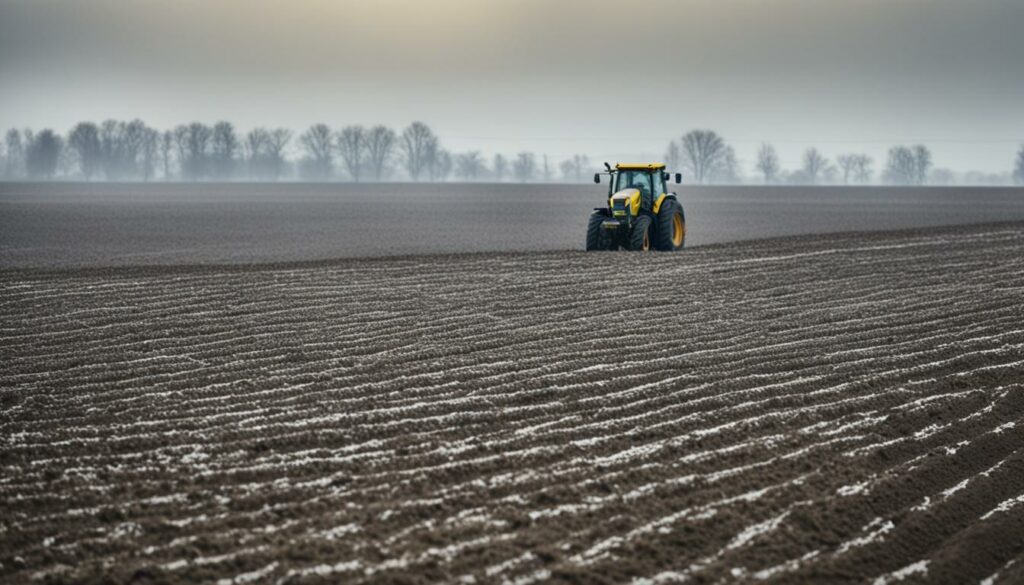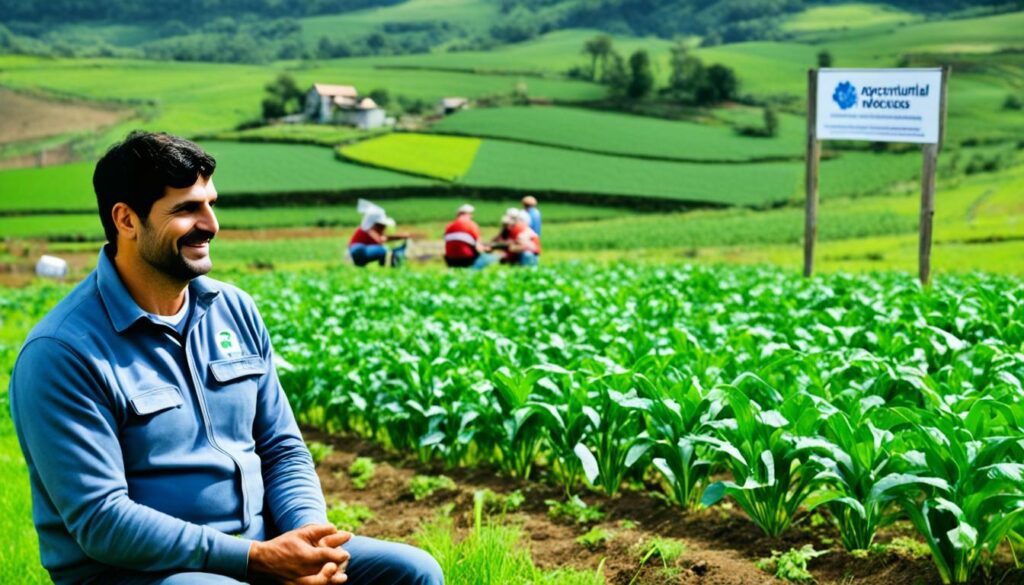Menu

Did you know that farmers struggle a lot with mental health issues? A 2019 review showed they face high rates of stress and mental illness. This is due to many challenging factors, such as changing market prices and unpredictable weather.
The unique difficulties in farming lead to more anxiety, depression, and suicide. With this in mind, agricultural extension services are vital. They help farmers cope with stress and sickness by offering knowledge, resilience support, and a stronger community.
Agricultural extension services help farmers by offering them useful advice and support. These services aim to boost farm productivity, manage resources more efficiently, and improve the quality of life for farming families. This includes taking care of their physical and mental well-being.
There’s a big need for mental health support in the countryside because mental illnesses are more common there. Farmers and ranchers, in particular, suffer from high rates of mental health issues and suicides. In 2016, the suicide rate for men in these occupations was 43.2 per 100,000, which was much higher than the overall male rate of 27.4 per 100,000. These figures show that rural mental health support is crucial.
Rural mental health support is a vital part of agricultural extension services. The National Farmers Union and the American Farm Bureau have websites dedicated to rural mental health. These sites provide resources like stress management tips and awareness about mental health. They also offer strategies for dealing with changes.
Through hard work and by always adapting, agricultural extension services are working to make life better for farmers. They aim to save lives and make rural areas healthier. These efforts are key in improving the mental health situation in the countryside.
| Year | Initiative | Impact |
|---|---|---|
| 2023 | AgWellness Program | Distributed vouchers assisting around 250 individuals, covered over 1,600 therapy appointments, paid $263,000 in behavioural health expenses. |
| 2016 | Suicide Rate Study | Identified a male suicide rate of 43.2 per 100,000 among farmers and ranchers, highlighting the urgent need for mental health initiatives. |
| 2018 | Journal of Rural Health Article | Highlighted trends and characteristics of occupational suicide and homicide in farmers and agriculture workers from 1992 to 2010. |
I care a lot about farmers’ mental health. I know they face many tough issues. The stress comes from things like money problems, the weather, and feeling isolated. These affect how happy they are and their life quality.
Farmers often worry a lot about their jobs. Bad weather, changes in the market, and not having enough people to help can really stress them out. Because of this, they might find it hard to focus, sleep, or be with others. This stress can even make them sick, causing problems like heart disease or high blood pressure.

Feeling down is common among farmers. They work hard and are often alone. The fact is, some farmers get so sad they think about suicide. In 2016, more farmers died by suicide than other working men, according to studies. We need to do more to stop this, because suicide is a leading cause of death we can avoid.
Farmers find it difficult to get help for their mental health. This is especially true in the countryside, where there are fewer services. But, mental health problems are also more common there. So, the lack of help is a big problem. It makes it hard to stop suicides and other issues.
We must work hard to support farmers’ mental health. By making help easier to get and building strong communities, we can make a real difference. This could help stop suicides and make farmers lead happier lives.
In the farming community, mental health challenges are real. Agricultural extension services stand as essential support. They offer crucial help, reducing stress, anxiety, and depression among farmers. This support is specially designed for those working in the fields.
Workshops on farmer well-being are key for these services. They aim to make people aware of mental health issues. Also, they teach practical ways to handle stress and anxiety. For instance, over half of Canadian farmers experience these issues, showing how important these workshops are. They also help end the silence and taboos around mental health in farming.
Field visits are a significant part. Professionals visit farms to offer direct help. They observe and deal with the specific mental health needs of farmers on their farms. For example, in Ohio, 55 farmers felt stress and depression from cash grain farming. Such visits make sure they get advice that fits their situations.
Support from the community is vital for farmer mental health. Extension services help in building this support. They arrange events that bring farmers together, boost social connections, and well-being. With a high number showing depressive signs in places like Iowa and Colorado, these initiatives are key. They allow farmers to connect, share stories, and support each other in their shared struggles.
Using a mix of workshops, field visits, and community activities offers a solid approach. This strategy helps tackle mental health issues in agriculture. The mental health support from these extensions is crucial. It ensures farmers get the help they need to be both healthy and successful.
Looking at real initiatives teaches us much about adding good mental health help to agricultural services. The North Dakota Extension Programme and the Cornell Small Farms Programme are key. They show us good approaches and their impacts on farming communities.

The North Dakota Extension Programme helped a lot with mental health in farming. Fraser et al. (2005) found a strong link between farming and mental health issues. The North Dakota team has used some great methods:
These strategies have cut down on stress and helped with depression and anxiety. These problems were common among farmers, as Jones-Bitton et al. (2019) noted.
The Cornell Small Farms Programme is great at helping farmer’s mental health too. They offer education and support to deal with mental health issues:
Research by Elliott et al. (1995) and Brew et al. (2016) highlights these initiatives’ importance. They help lessen depression and stress among farmers. The programme’s wide-ranging approach boosts resilience and improves mental health overall.
The North Dakota and Cornell programmes show us how careful mental health plans can make a big difference. They help farmers become stronger and healthier mentally.
Helping farmers with their mental health is challenging. There are many barriers to mental health resources for farmers. One big problem is how mental health is seen. This stops farmers from getting help. Changing these views is tough but very important.
Living far from others makes it hard to get mental health care. Farmers often live in places without many services. There are not enough mental health experts in rural areas. This makes it even harder for farmers to find help.
Moving money and not having good insurance is also a big problem. The Illinois Agricultural Mental Health Voucher Program gives a good solution. It offers three free counselling sessions for farmers and their families. This helps break down barriers to mental health resources for farmers.
This program also makes it easier to find local mental health workers. It connects Illinois farmers with experts in mental health. This stops them from having to travel far for help. It also cuts down on wait times for appointments.
There’s not enough mental health help that really understands farmers. They feel a lot of stress. Things like anxiety and feeling hopeless happen more to them than to other people. The Illinois Agricultural Mental Health Voucher Program tries to help. It’s funded by the Illinois and U.S. Department of Agriculture. It aims to give farmers the support they need.
Understanding mental health is key in helping farmers deal with their feelings. Many studies show that knowing about mental health helps people in agriculture feel better.

Mental health literacy means being able to spot, handle, and stop mental health problems. It is extra important in farming places where there’s a lot of stress from money, weather, and social issues.
Studies by Jones-Bitton and Elliot found many farmers in Canada and Ohio face stress, anxiety, and depression. Better knowledge about mental health can reduce shame and make farmers more likely to get help.
Teaching about mental health helps farmers a lot. For example, a training called “In the Know” took place in Ontario, Canada, in 2018. Farmers there got better at recognising and dealing with mental health problems right after.
In Australia and New Zealand, they also run programmes to teach farmers about mental health. These efforts improve how farmers understand and support those with mental health struggles. They give farmers the skills to cope and encourage them to seek help early.
Adding mental health services to agriculture programmes is key. This helps create a healthier farming community. Many rural areas lack mental health providers. So, it’s important to mix mental health and farming support.
Life as a farmer can bring stress, sadness, and anxiety. There is a big risk of suicide. For example, in 2016, more farmers died by suicide compared to other jobs. A 2018 study showed farming has higher suicide rates than other jobs.
Despite the need, getting mental health help is tough for farmers. Research in 2017 showed rural areas have more mental health issues but less help. This is because rural places are far away from mental health services.
Farmers face many tough things that can hurt their mental health. Things like money worries, bad weather, and market changes can add to the stress. To help, we need to look at these problems and find solutions through better programmes.
Many farmers in places like Ohio, Iowa, and Colorado are feeling very stressed. This makes it clear we need to support them better. Including mental health services in farming support programmes can make a big difference. It offers a complete way to care for farmers.
Climate change makes mental health challenges even bigger. Traditional farming help can evolve to meet these new needs. For example, the “Farm-Link” in Australia shows how important it is for mental health providers to understand farming.
Canada’s “In the Know” is a great example of a helpful initiative. It aims to teach farmers about mental health. By focusing on farming-related issues, such programmes can make a real difference. They pave the way for more tailored support.
“Mental health literacy programming, specifically for farming populations, has shown success in increasing general mental health knowledge, improving attitudes, and encouraging help-seeking behaviour.”
Helping farmers’ mental health with a full approach is vital. A strategy that combines farming and mental health support is needed badly. This approach must be open and relevant to farming communities.
We see a big need to change our mental health support for farmers. From 1992 to 2010, suicide among farmers and mental health problems have been major issues. We must create a support system that matches the farming culture. This way, we can help farmers lead healthier lives mentally.
Economic stress can really hit farmers hard, affecting their mental health. The mix of changing prices, high debt, and trade problems makes things worse. This leads to serious mental health struggles in rural areas.

The ups and downs of commodity prices play a big role in farmer’s mental stress. When prices constantly change, so do their incomes. This can cause a lot of worry and stress.
Farmers face a lot of stress due to the increasing debt. Trying to pay off these debts can really affect their mental well-being. For example, farmers in Ohio feel more depressed and stressed because of their debts.
Trade fights add even more economic pressure on farmers. The changes and uncertainty can really mess up their finances. It’s been found that these issues lead to more mental health problems like anxiety and depression.
The struggle with money and debt is very tough on farmer’s mental health. They often end up trapped in a cycle of stress. It’s clear they need wide support to battle these hardships.
It’s crucial to encourage farmers to seek help for their mental health. A study in Texas talked to 429 farmers about mental health challenges. It found that helping farmers to use mental health services is very important.
This survey covered 32 counties. It showed that feelings of shame, traditions, and the nature of farm work stop farmers from getting help. Overcoming these feelings is key to their well-being. Research by Fraser (2005) and Baker (2022) agrees, saying that mental health issues are common in farming communities.
The study suggested creating programmes that help farmers feel part of a group and encourage them to seek help. It supports findings by Klik (2019). Such programmes not only tell farmers about mental health resources but also make it easier for them to actually use these resources in a friendly and supportive way.
Teaching and learning are crucial for farmers to start seeking help. The paper recommended making a central place for mental health resources. This place would help spread the word and offer the help that farmers need. This way, farmers could easily learn more and get the help they need for their mental health.
Also, the research suggested new ideas to improve mental health support for farmers. For instance, Roy (2017) looked at how farmers take care of themselves. They found interesting ways farmers cope and say there should be special help for them. Applying such findings can change how mental health support is given to farmers.
So, helping farmers to look after their mental health is a big task that needs to deal with many issues. By teaching and making better use of the available help, we can build a system that cares for everyone in farming communities.
The link between how farmers see themselves and the support they get from others is key. It helps us understand farmers’ mental health struggles. Having strong relationships and being part of a community help farmers feel they belong and are supported.

Social identity theory says we find ourselves in the groups we are part of. This is very true for farmers. A study in 2022 showed many farmers feel alone. This makes them more stressed and less hopeful.
Guidance from outside, like extension services, can boost farmer’s connections. This lowers their chances of feeling cut off. It can make a big difference in their mental health. Sadly, farming has high rates of depression and suicide. It’s the fourth highest for suicide deaths.
Mental health support in farming is greatly helped by strong community ties. This is called social capital. It’s about the connections and trust that help people work together better. Research shows that being financially stable and close to others is good for a farmer’s mind.
Farmers mostly turn to family and close neighbours for advice. Having these strong personal bonds is critical. For example, during tough times like the US-China trade disputes, most Midwest farmers saw their incomes drop. This really affected their mental health.
In short, it’s vital to boost farmer’s sense of who they are and their social networks. This helps tackle the specific challenges they face. Extension services play a big role here. They should focus on strengthening these ties. This can improve the mental health of farmers overall.
Agricultural support programmes help improve the mental health of farmers. They provide national farmer mental health programs and initiatives specific to local needs. These efforts use various approaches to support the well-being of farmers and their families.
The USDA NIFA Farm and Ranch Stress Assistance Network (FRSAN) Program plays a key role. In FY21, it provided about $25 million across 50 grants. This support is aimed at reducing stress and enhancing the mental health of farmers nationwise. It helps create a consistent structure for programmes at the state level to have a bigger, more positive effect.
Local support systems are crucial in recognising and dealing with specific challenges in farming. Take, for example, the launch of Virginia’s AgriStress Helpline in March 2022. It received calls both for information and emotional support, showing immediate positive outcomes. In Idaho, a program was set up by the University of Idaho Extension and the Farm and Ranch Center. They offered stress workshops, highlighting the need for teaching mental health in a way that’s inclusive and sensitive to different cultures.
In North Dakota, FirstLink with the State Department of Agriculture provided over 1,100 counselling sessions between September 2021 and March 2023. This deep level of support emphasises the importance of well-trained resources for farmers. Somewhere else, in Massachusetts, peer support training has helped more than 100 people through in-person sessions since January 2023. It shows just how effective local mental health support communities can be.
| Programme | Initiative | Impact |
|---|---|---|
| FRSAN Program | 50 grants | Nearly $25 million allocated |
| AgriStress Helpline | Information/referral and emotional support | 39 calls for referral, 13 for crisis support |
| Idaho Farm Stress Workshops | English and Spanish classes | 18 English participants, 71 Spanish participants |
| FirstLink Counselling | Direct counselling sessions | Over 1,100 sessions provided |
| Massachusetts Peer Support | In-person training sessions | Over 100 participants |

In the future, mental health support in farming must be filled with new ideas and policies. We need to find better ways to help the mental health of farmers. This will create strong bases for keeping farming communities well.
New ways to help with mental health on the farm should focus on using tech and fresh ideas. The Agriculture Wellness Program is a good start. It has already helped 70 people and paid $60,000 in mental health bills.
Things like the Ag Wellness Podcast and the Ag Wellness Course show how to think differently. They help spread the word about mental health in farming. By putting on stress workshops and teaching farm safety, we can lower depression and suicide rates.
Having good policies is vital for the mental health future of farming. We should make it easier for farmers to get mental health help and support group work. Also, more money should go into programmes like the Southern Extension Risk Management Education grant.
It’s also important to train more people to help farmers with their mental health, like the extension agents in Michigan. Plus, working with groups like AgrAbility and the Farmer Veteran Coalition will really help. They focus on farm safety and mental health, boosting efforts for rural well-being.
Overall, making and growing these policies will help farmers and their families feel better emotionally and mentally.
Agricultural extension plays a crucial role in maintaining farmers’ mental health. It helps deal with mental health issues by educating, engaging with communities, and offering new ways of help. Several studies, including those by Yazd et al. (2019) and Fraser et al. (2005), show the big problem of mental health among farmers. These services are key to making things better in the agricultural sector.
Research by Jones-Bitton et al. (2019) and Reed and Claunch (2020) points at serious issues like stress and depression. These get worse because of money troubles and changes in the environment, as Berry et al. (2011) mentions. So, agricultural programmes need to provide specific kinds of help. Efforts like Mental Health First Aid, which Talbot et al. (2016) look at, are very important for rural areas.
Insight from Ross et al. (2010) and Stallones and Beseler (2016) link mental health problems to farming work, like exposure to pesticides. The high suicide rates among farmers, seen in a 2020 report, show how urgent mental health support is. It’s clear we need these strong extension services for farmers’ well-being. This way, we can support the mental health of farmworkers, ensuring a stronger future for all.
Agricultural extension services help improve mental health. They do this through workshops, visits, and activities that bring farmers together. These efforts reduce stress and mental health issues by teaching and supporting farmers.
These are programmes that educate and support farmers. They help boost farm output, manage resources, and enhance life quality. Mental health is a key part of their work.
Farmers often deal with lots of stress and fear. This comes from money issues, the environment, and social problems. Sadly, depression and suicide are too high, with little mental health help in rural spots.
Money worries, like changing prices and debts, really hit farmer’s mental health. This can lead to more anxiety, stress, and depression.
In North Dakota’s and Cornell’s programmes, mental health projects have worked well. They’ve shown how extension services can reduce stress, build strength, and improve mental health among farmers.
There are many hurdles in mental health support. These include the fear of talking about mental health, living far from help, not enough resources, and lacking programmes really for farmers. Overcoming these obstacles is key to better mental health care.
It’s very important for farmers to understand mental health issues. Learning about these topics can help reduce shame, encourage help-seeking, and early care for mental health.
By adding mental health care to farming programs, farmers get better overall support. Treating both the farm’s and the mind’s health leads to stronger, healthier farmers.
Social roots and connections are crucial for a farmer’s mental well-being. Knowing how these affect mental health helps in making educational and support programmes that strengthen farming groups and mental health.
Yes, there are mental health programmes for farmers at different levels. National strategies and local efforts together ensure that mental health care meets the needs of all farmers.
The future of mental health in farming is in new solutions and helpful policies. These plans focus on making mental health care lasting and better for all farmers.